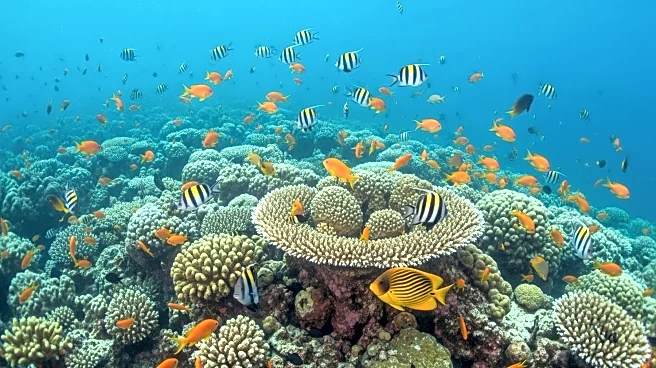What's Happening?
Recent research has highlighted the reliance of the global marine aquarium fish trade on wild populations, with a significant portion of fish sold in the U.S. being wild-caught. The study, led by Dr. Bing Lin from the University of Sydney, found that approximately 90% of marine fish species sold by major U.S. aquarium e-retailers were sourced from the wild, primarily from the western Pacific and Indian oceans. The industry, valued at $2.15 billion globally, sees the U.S. as a major consumer, accounting for two-thirds of the demand. The research underscores the opaque nature of the supply chain, which often leaves consumers unaware of the origins of the fish they purchase. The study also noted that many species sold are listed as threatened or declining by the International Union for the Conservation of Nature.
Why It's Important?
The findings raise concerns about the sustainability of the marine aquarium fish trade and its impact on biodiversity. The reliance on wild populations for aquarium fish can exacerbate the decline of already threatened species, potentially leading to further ecological imbalance. The trade is crucial for local communities that depend on it for income, but without proper management, it risks depleting natural resources. The study calls for stronger traceability and oversight in the supply chain, as well as credible eco-certification schemes to ensure sustainable sourcing. This could help protect biodiversity while maintaining economic opportunities for communities involved in the trade.
What's Next?
The study suggests that increased consumer awareness and support for well-managed wild fisheries could be pivotal in ensuring sustainable practices. There is a call for international cooperation to enhance regulations and traceability in the trade, potentially involving stricter enforcement of existing conventions like CITES. The development of eco-certification schemes could provide consumers with the information needed to make informed choices, aligning with sustainable development values.
Beyond the Headlines
The ethical implications of the trade are significant, as it involves the capture and transport of live animals across the globe. The lack of transparency in the supply chain raises questions about animal welfare and the environmental impact of the trade. Long-term shifts in consumer behavior towards more sustainable practices could drive changes in industry standards, promoting conservation efforts and ethical sourcing.










